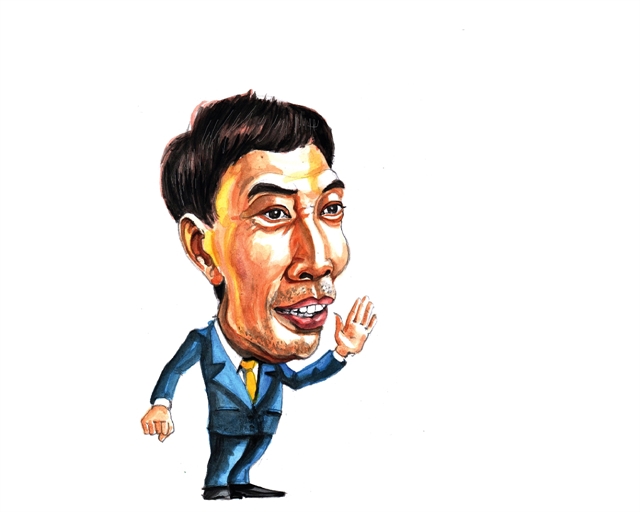_med.jpg) Economy
Economy

 |
| Police inspect a pawnshop of F88 Business Joint Stock Company in Biên Hòa City in the southern province of Đồng Nai. — VNA/VNS Photo |
Võ Trí Thành*
In early March, HCM City Police raided the headquarters of F88 – a non-banking financial firm based in the city. The company, whose full name is F88 Business Joint Stock Company, was investigated for allegedly using “extortion” measures to collect debts and dodging the laws to force debtors to pay sky-high interest.
F88 claimed itself as the fastest-growing financial service provider in Việt Nam. It has 830 branches across the country, offering a range of financial services, including insurance, money transfer, and small loans mortgaged by vehicles or personal assets.
The F88 inspection followed many cases recently detected by police forces in which debt collecting organisations threatened or even terrorised thousands of people and their families for their late debt payments or illegally appropriated assets of debtors.
The cases raised questions on whether such non-banking financial firms allowed to act as an official lending channel can address people’s demand for consumer loans and how to fully exploit its potential and efficiently manage the channel.
 |
Expert Võ Trí Thành
Potential market
First appearing 3,000 years ago, pawnshops are considered the earliest form of financial lending in history. At present, this kind of business has become globally popular and is classified as a microfinance service. The advantage of the activity is that customers can quickly get a loan with simple procedures, using items of personal property as collateral and the borrowed money depends on the value of the assets.
Pawnshops have been thriving in Asia and the US. In the US, according to Coherent Market Insights Pvt. Ltd (March 2022), has more than 12,000 pawnshops, concentrated in Texas (1,731 establishments), Florida (847 establishments) and Georgia (825 establishments).
It is estimated that the US pawn market will be worth US$4.12 billion by 2028 at a CAGR (compound annual growth rate) of 6.8 per cent. The number of people working in the pawn industry here is over 70,000 people. Big pawn chains like FirstCash, Big Pawn, EZCorp, PAWNGO, and UltraPawn all have millions of regular customers.
In Thailand, there are more than 10,000 pawnbrokers belonging to three “giants”, namely Ngern Tid Lor, Srisawad and Muang Thai Capital (MTC). Total revenue of Muang Thai Capital was more than 16 billion baht ($500 million) in 2021, a year on year increase of 8.8 per cent.
Meanwhile, in Việt Nam, to deal with people’s large demand for consumer loans and limit the “black credit” activities or operation of loan sharks – which usually cause social disorder and negative impacts on the financial market, the State Bank of Việt Nam has allowed the establishment of small-scale finance organisations since the early 2000s.
As of the end of 2022, there are 27,000 pawnshops operating in Việt Nam, according to statistics of the Ministry of Public Security. Some large companies have outstanding loans reaching from several hundreds to thousands of billion of Việt Nam đồng. F88 is currently the largest pawnbroker with a chain of 830 stores nationwide with outstanding loans totalling as much as VNĐ1.7 trillion ($72 million).
According to the statistics of BIDV Research and Development Institute, non-banking financial institutions (including consumer financing) accounted for 11.7 per cent of the total outstanding loans by the end of June 2022. Total outstanding consumer loans only currently reach VNĐ2.5 quadrillion. Other financial organisations (excluding commercial banks and financial companies permitted by the State Bank of Việt Nam) are providing nearly VNĐ300 trillion serving the basic needs of people.
Việt Nam's pawn market is considered to have many similarities with Thailand and the market still has a large development potential. Statistics show that up to 69 per cent of Vietnamese people do not have a bank account, thus unable access to financial and banking services and more than 33.4 million people are working in the informal sector – this is the main segment of customers that pawn businesses and microfinance firms target.
According to FiinGroup statistics, Việt Nam's consumer outstanding loan/GDP ratio is still very low compared to other countries in the region. Currently, Hong Kong's consumer credit/GDP ratio is 90.54 per cent; the ratio in Korea, Malaysia, Japan, Singapore, Taiwan (China), China are all over 50 per cent, while that of Việt Nam is only 27.17 per cent.
With the above potential, the pawn business in Việt Nam is evaluated to have a lot of room for development. However, currently, it is facing many problems related to interest rates and the legal basis for debt collection due to inadequate legal regulations and sanctions not being strong enough.
Currently, the lending interest rates offered by pawnshops must not exceed 20 per cent per year according to the Civil Code 2015 but there are no specific regulations on fees such as appraisal fees, mortgage management fees, etc., leading to sky-high fees for borrowers and potential violations of the law by lenders.
Especially after the debt collection service business was abolished in the Investment Law 2020, in order to collect debt, lending institutions can file a lawsuit or denounce to competent authorities. However, these measures are in fact ineffective. As a consequence, pawnshops have to resort to solutions such as threatening or terrorising borrowers and property appropriation, like the cases under investigation recently.
Perfecting legal corridor
Some countries in the region have specific regulations on lending interest rates and fees for pawn services. For example, Singapore stipulates a ceiling interest rate of not more than 1.5 per cent per month and has specific regulations on surcharges which do not exceed $10, and pawnshops are not allowed to collect any additional fees other than those regulated.
Countries and territories like Thailand, Malaysia and Hong Kong also have regulations on ceiling interest rates ranging from 2-3.5 per cent per month and detail a number of fees and charges to be collected.
Regarding debt collection activities, these countries also have very specific regulations such as: After verifying the borrower's financial capacity, the lender will send a debt collection letter to the borrower. If the borrower does not respond, the lender will appoint a third party to collect the debt or initiate a lawsuit to collect the debt. Debt collectors must follow the provisions of the "Code of Conduct for Debt Collection". If the debt collectors commit harassment, they will face a number of fines or even a sentence penalty, depending on the severity of each case.
In Việt Nam, the establishment of non-banking financial institutions like F88 is a step towards legalising informal credit organisations, creating a transparent financial market and regaining customers' confidence. This decision also matches the approach of economists early 1970s which favour the formalisation of small-scale financial institutions to meet the demand of people who are unable to access bank loans.
It is essential to have a legal corridor to both create conditions for the market to develop but not to let the business get out of control. A regulatory sandbox like that in the fintech sector is needed to prepare for completing the legal framework.
The Government should promulgate specific regulations on lending interest rate ceilings and accompanying service fees, not just the lending rate ceiling as currently prescribed in the Civil Code 2015.
Debt collection activities must be professionalised and a legal and conditional business to support consumer finance activities, thus there is a basis for building a debt settlement law.
It is necessary to develop a detailed and complete legal framework for debt collection services for formal and informal consumer finance activities, such as legal forms of debt collection, prohibited debt collection acts and heavy sanctions in the case of violations, etc.
In addition, there should be regulations on protecting consumers engaging in consumer financial activities like in Malaysia.
The role of intermediary institutions like women’s associations or veterans' associations in developing micro-finance in rural areas should be promoted, so that people in the area are able to avoid traps by shark loans.
Finally, people’s awareness of personal finance must be raised through communication and education programmes, thereby helping people form habits of borrowing and repaying on time.
*Võ Trí Thành is a senior economist at the Central Institute for Economic Management (CIEM) and a member of the National Financial and Monetary Policy Advisory Council. A doctorate in economics from the Australian National University, Thành mainly undertakes research and provides consultation on issues related to macroeconomic policies, trade liberalisation and international economic integration. Other areas of interest include institutional reforms and financial systems. He authors Việt Nam News column Analyst’s Pick.




